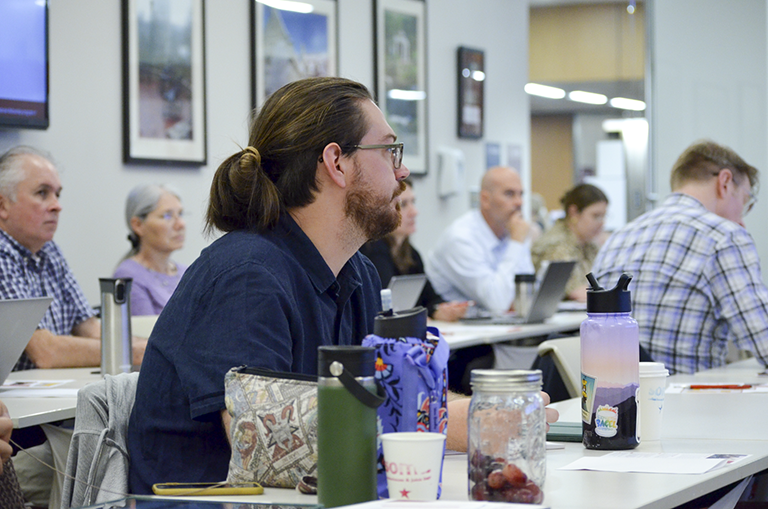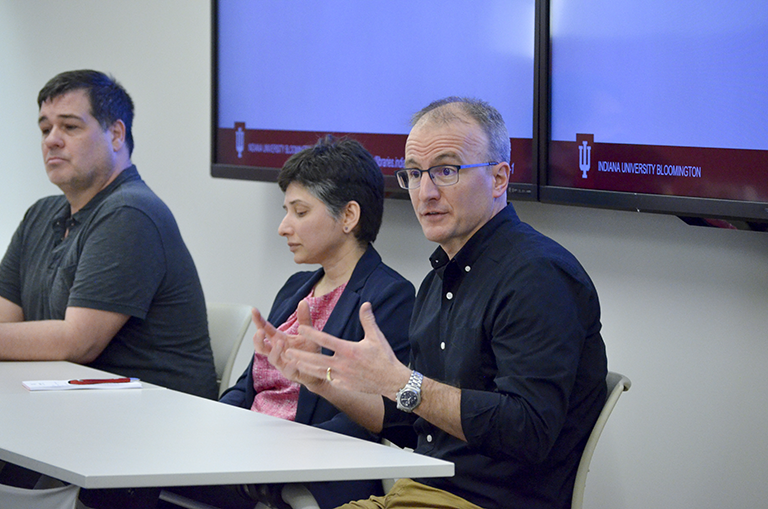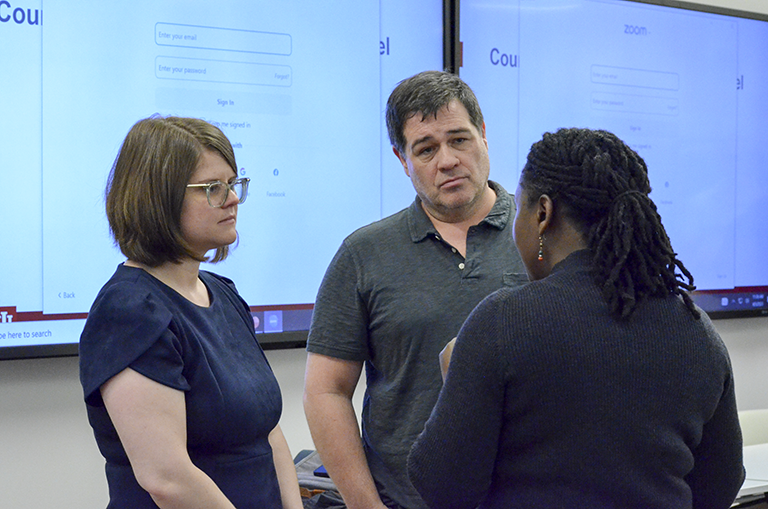
On Wednesday, April 5th, IU Libraries hosted an Open Education Showcase in celebration of Open Education Week. The Showcase was an opportunity to celebrate the progress that IU Bloomington has made so far in promoting and furthering open education. It also provided inspiration for what next steps might look like at IUB and across the state of Indiana. The event opened with an introduction from the Ruth Lilly Dean of University Libraries, Diane Dallis. Open Education Librarian Sarah Hare announced the inaugural winner of IU Libraries’ Open Educator Award, Michelle Facos. Dr. Facos has saved students thousands of dollars by utilizing an openly licensed resource, Smart History, in her Modern Art course.
Sarah then introduced the main speaker of the morning, Amanda Hurford. Amanda shared data that the Private Academic Libraries Network of Indiana (PALNI) collected about the impact of course material costs on students and the resulting programs that PALNI has created in response to this problem. Next was a panel of three faculty members that participated in the 2020 and 2021 cohorts of the Course Material Fellowship Program, followed by lunch. The day concluded with breakout sessions where attendees could consult with the speakers and learn more about their projects.
Course Material Fellowship Program Panel
Panelists
- Greg Carter, an Assistant Professor in the School of Nursing, was drawn to Open Education out of concern with the increasing cost of course materials and the gaps in health outcomes for minority populations in the United States. His project is still in development but incorporates current media and representations of prominent health issues. He was a 2021 Fellow.
- Sapna Mehta is a lecturer in the IU Biology department, and her project combined several existing Molecular Biology OER to create a customized text for her students. The final OER she created is interactive and presents concepts to students through both text and in-depth visuals. The first version of her OER is in IUScholarWorks and she’s currently working on a second edition. She was a 2020 Fellow.
- Rick Hullinger is a senior lecturer and cognitive scientist in the department of Brain Psychology and Brain Sciences. Dr. Hullinger came to Open Education with an interest in adapting his statistics course to be more relevant to students as well as trying new pedagogical techniques. His project was to produce a series of video lectures in a flipped course format, which enabled him to embed links to resources for students to clarify their understanding and explore further. All of the videos are openly licensed as an OER. He was a 2020 Fellow.
Takeaways
Panelists emphasized that the process of creating open education resources is both challenging and highly rewarding. The speakers all agreed that using OER changed the way they teach and allowed them to integrate more current and relevant concepts, real world examples, and assessments for their students. While there is a learning curve to creating OER without the help of a formal publisher, the panelists cited the freedom this enables as an opportunity to experiment and improve their classes. One panelist commented that creating their materials helped them reflect on what students actually needed to know. They were forced to consider what was most important or vital to student learning. They noted that “quality does not always mean complexity” and part of their process was realizing that their work was to make concepts and issues clearer to their students.

Fellows also described challenges that they have faced, including the need for more consistency in design in order to reduce cognitive load for students. One panelist noted that they plan to make a second edition soon that will make the numbering, headings, and visuals more consistent throughout their text. Another panelist described some concerns about the long-term use of their final product by others. He had heard that other instructors were interested in using it, but he shared his initial resistance to this and articulated the need for more standardized ways to trace impact of his resource as it is used and remixed by other instructors within the larger academic community. For example, having mechanisms built into OER sharing systems to track re-use and revision would be helpful. Another panelist expressed the need for department-wide buy in so that resources are adopted across the curriculum and used consistently, not just by one instructor for a few semesters.
The panelists had several suggestions for those interested in creating OER. One of the most important insights from the panel was that you must start small. Instructors are often excited about moving away from their textbook and creating or adapting something that is customized for their students. But that often results in taking on too much. Having an idea of what a first iteration of the OER looks like (and a second iteration, and a third) is useful instead of trying to do everything all at once. Panelists recommended also being intentional, both about how learning objectives are connected to the readings/ activities that students are doing and in the use of assessments. All the panelists discussed how they have used student feedback and quick assessments to revise the text—one of the benefits of OER is the ability to make changes and updates, and the fellows are excited to use data to do that.
Statewide Strategies for OER Impact
Amanda’s talk, “Statewide Strategies for OER Impact,” was inspirational and insightful and framed many of the discussions throughout the day. Amanda shared information about PALNI, their mission, and their commitment to student success. She also shared data that PALNI collected to gauge how course materials impact students across the consortium. PALNI has used this data to create several programs, including PALSave and a textbook creation grant. The pilot project for the creation grant, The Bible and Music, has recently been published. Amanda gave the audience a useful overview of the principles that underpin PALNI’s work with affordable course material: working as a community, using data to assess progress, and continually piloting and experimenting. Audience questions centered on program specifics and future plans.

Interested in OER?
A new call for proposals to the Course Material Fellowship Program will be shared in August 2023. For more information about Open Educational Resources and the CMFP, visit the Course Materials Fellowship Program website. Any instructor interested in the CMFP or affordable course materials is welcome to e-mail Open Education Librarian at iusw@iu.edu. Sarah offers workshops and consultations to all interested instructors.
Leave a Reply